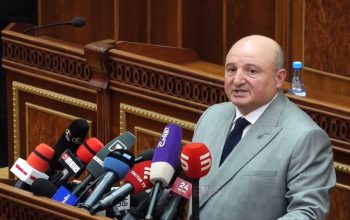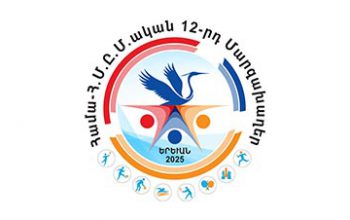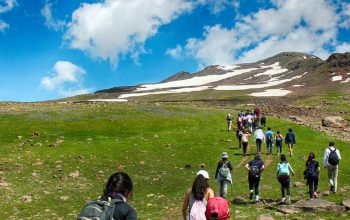By Harut Sassounian
As if we didn’t already have enough disputes among Armenians, a new argument surfaced last week between Arman Babajanyan, head of a minor pro-Western political party that supports Prime Minister Nikol Pashinyan, and former Foreign Minister of Armenia Vartan Oskanian.
On April 8, 2025, Babajanyan wrote on his Facebook page that Pres. Robert Kocharyan and Oskanian told U.S. diplomats in July 2007: “they are ready to obstruct the acceptance of the Armenian Genocide Resolution by the U.S. Congress, if Turkey simply opened the border or reactivated the Kars-Gyumri railroad.”
Babajanyan somewhat misquoted Oskanian’s words as having told U.S. Deputy Assistant Secretary of State Matthew Bryza during a meeting in Yerevan in 2007: “If Turkey opens its border and normalizes relations, I am flying to Washington the next day to convince the Armenian lobbies not to support the Armenian Genocide Recognition Resolution.”
Here is what Bryza actually wrote after meeting with Armenia’s top officials: “Bryza learned that Armenia would intercede in Washington to slow a Congressional Armenian ‘Genocide’ Resolution (AGR) only if the Turkish side opens the border, or at least allows the reopening of the cross-border railroad…. FM Oskanian offered the most concrete articulation to date about what Armenia would consider a significant enough gesture of Turkish good faith for Armenia to make a serious effort to soften momentum toward an AGR. Oskanian reiterated Armenia’s continued skepticism about Turkey’s motives, and concern that overtures to Armenia are aimed only at diverting European pressure and derailing a possible AGR. Oskanian said, however, that if Turkey were to open its border and normalize relations with Armenia, he would be ‘on a plane the next day’ to Washington to confer with Armenia’s friends on Capitol Hill and pro-Armenian lobby groups to hold off passage of an AGR. In a new twist, Oskanian said that if Turkey were willing just to restore railroad traffic on the existing Kars-Gyumri rail line, that might be enough for the GOAM [Government of Armenia] to engage the Armenian-American community on AGR. He could not, of course, guarantee an outcome, but vowed to make a good faith, high-level effort to persuade Washington interlocutors that an AGR would be counter to Armenia’s national interests if the Turks offered real movement on the border issue.”
Bryza wrote this report following his July 2007 meeting in Yerevan with Kocharyan and Oskanian. Bryza’s internal U.S. report was revealed to the public by WikiLeaks several years later.
Babajanyan went on to quote Kocharyan from Bryza’s report as saying: “I don’t need the [Armenian genocide recognition] Resolution. I need an open border and the possibility of a balanced trade with Turkey.”
Oskanian angrily responded to Babajanyan on Facebook on April 10, accusing him of “circulating fake news supposedly based on WikiLeaks.” Oskanian stated that Babajanyan “is lying. His interpretations and conclusions cannot emanate from the content of the WikiLeaks’ original [document] and the nature of discussions. The document is attached.”
After I researched the WikiLeaks documents dating back to 2007 and compared them to Babajanyan’s and Oskanian’s posts, I discovered the reason for their contradictory statements.
Babajanyan failed to clarify in his Facebook post that he was quoting from two different reports of Bryza’s meetings in Yerevan, which took place on separate dates. The first was on March 28, 2007, and the second on July 30, 2007. Babajanyan posted undated excerpts from the two documents.
Therefore, when Oskanian wrote that Babajanyan “is lying” because there is no such statement in the WikiLeaks document, Oskanian must not have realized that Babajanyan was referring to Bryza’s second report.
In fact, in his second report of his meeting with Pres. Kocharyan, Oskanian and Presidential Assistant Vigen Sargsyan on March 28, 2007, Bryza wrote: “Kocharyan and Oskanian revealed their profound skepticism about Turkey’s good faith, and their weariness with a process that looks to them designed in Ankara merely to deflect the pressure of world opinion, while never granting Armenia the slightest concrete result.” They said: “Although Armenia would reciprocate [Turkey’s] positive gestures, the GOAM is tired of the endless cycle of gestures and discussions leading nowhere in its Turkish relationship. What is most important to Armenia, Kocharyan said flatly, is the border. Diaspora groups had been pressing him to support passage of the Congressional resolution, but he had refused: ‘I don’t need it,’ he said. ‘What I need is the border open and an opportunity to offset the giant trade imbalance with Turkey.’”
Normally, a misunderstanding about the reference to a document would not be a major issue. However, given that Pashinyan’s circle uses every opportunity to blame the former leaders, including Oskanian, there was a sharp reaction from the latter. Babajanyan had harshly criticized Kocharyan and Oskanian stating that “they were not only ready to silence the Diaspora’s struggle for genocide recognition, sacrifice the entire people’s memory, but also openly underline that the recognition of the Genocide is not a priority on their agenda.” Babajanyan added that the former leaders call the current authorities “Turks, traitors, and land-givers.”
Here is the core of the problem. Babajanyan, in his obsession with discrediting the former leaders, is ignoring the fact that his ally Pashinyan has been the one repeatedly disgracing almost all Armenian national symbols. Pashinyan has raised unnecessary questions about the facts of the Armenian Genocide, even stating: “our official position is that the international recognition of the Armenian Genocide today is not on the priority list of our foreign policy.”
I would like to remind Babajanyan of the popular proverb: “Those who live in glass houses shouldn’t throw stones.” Before pointing fingers, make sure you own hands are clean.
This does not mean that I am defending the previous leaders. I have had numerous face-to-face arguments with both Presidents Kocharyan and Serzh Sargsayan regarding their positions on many issues, including Armenia-Turkey relations. However, I have bigger disagreements with Prime Minister Pashinyan.




